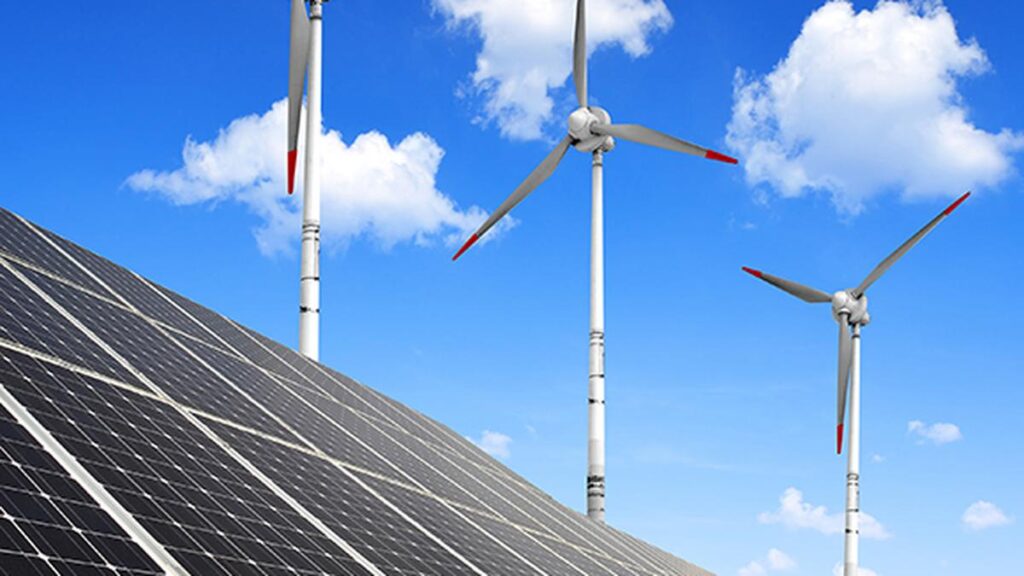
Jindal group targets 5 GW renewable energy capacity by 2030
Jindal Group Targets 5 GW Renewable Energy Capacity by 2030: $2.5 Billion Investment Plan
Table of Contents
- Jindal’s Ambitious $2.5 Billion Renewable Energy Investment
- Strategic Focus on Solar and Battery Storage Solutions
- Manufacturing Expansion: Solar Cells and Modules
- NHPC’s 300 MW Solar Plus Storage Project
- The Rising Importance of Battery Storage Technology
- BC Jindal Group’s Evolution in Energy Sector
- Indian Renewable Energy Market Projections
The expansion of Jindal’s renewable energy capacity to 5 GW by 2030 will be funded through internal accruals and debt, representing a major shift in the conglomerate’s energy portfolio. | Photo Credit: vencavolrab
Jindal’s Ambitious $2.5 Billion Renewable Energy Investment
The BC Jindal Group, one of India’s foremost business conglomerates, has unveiled an ambitious plan to achieve 5 GW of renewable energy capacity by 2030, marking a significant expansion of its green energy portfolio. Through its specialized renewable energy arm, Jindal India Renewable Energy (JIRE), the group plans to invest a substantial $2.5 billion (approximately ₹21,500 crore) in the renewable sector over the next five years.
This massive investment underscores the group’s commitment to addressing India’s rapidly growing energy needs while simultaneously contributing to the nation’s clean energy transition goals. The strategic investment comes at a time when India is aggressively pushing to expand its renewable energy infrastructure, with ambitious national targets for reducing carbon emissions and increasing the share of clean energy in its overall power mix.
Jindal’s Renewable Energy Investment Highlights
- Total Investment: $2.5 billion (₹21,500 crore)
- Target Capacity: 5 GW by 2030
- Investment Timeline: Next 5 years (2025-2030)
- Funding Sources: Internal accruals and debt
- Implementation Period: Expected completion within 4 years
The investment strategy reflects BC Jindal Group’s recognition of the transformative potential of renewable energy in India’s power landscape. By committing such significant resources to clean energy development, the group is positioning itself as a major player in India’s energy transition, while also creating substantial value for stakeholders through sustainable business practices.
Strategic Focus on Solar and Battery Storage Solutions
At the core of Jindal’s renewable energy strategy is a deliberate focus on solar power generation and battery storage technologies. The group plans to achieve its 5 GW clean energy target through a diversified portfolio comprising solar, wind, hybrid, and firm and dispatchable renewable energy projects. This multi-technology approach allows JIRE to optimize energy production across various geographical and climatic conditions while ensuring greater grid stability.
Battery energy storage systems (BESS) form a critical component of Jindal’s renewable energy roadmap. These systems address one of the primary challenges of renewable energy – intermittency – by storing excess energy during peak production periods and dispatching it during high demand or low generation intervals. By integrating advanced battery storage with its renewable projects, JIRE aims to enhance grid stability and provide more reliable clean power solutions.
Jindal’s Renewable Energy Technology Mix
The 5 GW target will be achieved through a strategic blend of renewable technologies:
- Solar Power Projects: Utility-scale photovoltaic installations
- Wind Energy Facilities: Onshore wind farms in high-potential locations
- Hybrid Renewable Systems: Combined solar-wind installations for optimized generation
- Firm & Dispatchable Projects: Renewable generation coupled with storage for on-demand power
- Battery Energy Storage: Advanced storage solutions for grid stabilization
JIRE is actively exploring partnerships with global technology leaders to develop and implement cutting-edge battery storage solutions. The company recognizes that high-quality, efficient battery systems will be essential for maximizing the value and reliability of its renewable energy assets. Through strategic technology collaborations, JIRE aims to incorporate the latest innovations in battery chemistry, management systems, and integration architecture into its projects.
Manufacturing Expansion: Solar Cells and Modules
In a strategic move toward vertical integration, Jindal India Renewable Energy is establishing a state-of-the-art manufacturing facility for solar cells and modules in Maharashtra. This facility will have an impressive annual production capacity of 2 GW and is scheduled to become operational by September 2026, representing a significant addition to India’s domestic solar manufacturing capabilities.
The manufacturing initiative aligns perfectly with India’s “Make in India” policy and the Production Linked Incentive (PLI) scheme for solar manufacturing. By investing in domestic production capabilities, JIRE aims to reduce dependency on imported solar components while strengthening the local supply chain. This approach not only supports national self-reliance in clean energy equipment but also potentially reduces costs and lead times for Jindal’s own solar projects.
| Manufacturing Facility Details | Specifications | Benefits |
|---|---|---|
| Location | Maharashtra, India | Strategic positioning in industrial hub |
| Production Capacity | 2 GW annually | Significant contribution to domestic manufacturing |
| Products | Solar cells and modules | Complete vertical integration |
| Operational Timeline | September 2026 | Aligned with capacity expansion goals |
| Technology | Advanced manufacturing processes | High-efficiency, globally competitive products |
The backward integration into component manufacturing represents a comprehensive approach to Jindal’s renewable energy business. By controlling more of the value chain, JIRE can better manage quality, costs, and supply reliability. The manufacturing facility is expected to create substantial employment opportunities while also fostering technology transfer and skill development in India’s growing clean energy sector.

Conceptual visualization of Jindal’s upcoming 2 GW solar cell and module manufacturing facility in Maharashtra, scheduled to begin production in 2026.
NHPC’s 300 MW Solar Plus Storage Project
Jindal India Renewable Energy recently secured a significant milestone in its expansion journey by receiving a Letter of Acceptance for a 300 MW solar plus storage project from NHPC, one of India’s premier hydropower generation companies. This achievement signals JIRE’s growing expertise and credibility in executing large-scale, technologically advanced renewable energy projects.
The project forms part of NHPC’s larger 1,200 MW inter-state transmission system-connected solar power initiative, which incorporates substantial energy storage capacity (600 MW/1200 MWh). The integration of storage components with solar generation represents the next evolution in India’s renewable energy landscape, enabling more consistent power delivery and greater grid integration.
Solar Plus Storage: The Next Evolution in Renewable Energy
The NHPC project showcases the advantages of combining solar generation with battery storage:
- Extended Generation Hours: Delivers power beyond daylight hours
- Grid Stability: Provides frequency regulation and voltage support
- Peak Load Management: Supplies energy during high-demand periods
- Reduced Curtailment: Stores excess generation instead of wasting it
- Improved Economics: Enables time-of-use arbitrage for better returns
This project will serve as a demonstration of JIRE’s capabilities in integrating advanced energy storage with renewable generation, positioning the company as a leader in India’s evolving firm and dispatchable renewable energy sector. The experience and expertise gained through this project will inform Jindal’s approach to future hybrid and storage-enabled renewable installations across its growing portfolio.
The Rising Importance of Battery Storage Technology
As India’s renewable energy sector continues its rapid expansion, battery storage technology is emerging as an essential component for ensuring grid stability and enabling efficient power management. Battery systems address the fundamental challenges of intermittency and variability inherent in solar and wind generation, making them crucial for the next phase of India’s clean energy transition.
The Indian battery energy storage system (BESS) market is projected to experience robust growth, with analysts forecasting a compound annual growth rate (CAGR) of 11% through 2032. This growth is primarily driven by the increasing need for round-the-clock renewable power supply, which cannot be achieved through standalone solar or wind facilities without storage capabilities.
Jindal’s strategic emphasis on battery storage technology reflects an understanding of these market dynamics and positions the company to capitalize on this growing segment. By developing expertise in storage integration and potentially manufacturing key components, JIRE can offer more comprehensive energy solutions that deliver higher value to both grid operators and energy consumers.
Battery storage technologies also enable renewable energy providers to offer additional grid services such as frequency regulation, voltage support, and black start capabilities. These value-added services represent potential revenue streams beyond basic energy sales, improving the economics of renewable projects and accelerating their adoption across India’s evolving energy landscape.
BC Jindal Group’s Evolution in Energy Sector
The BC Jindal Group’s ambitious renewable energy targets represent a significant evolution for a conglomerate that began its journey in 1952 as a steel pipe manufacturer. Over seven decades, the group has diversified into various sectors, with energy emerging as a key focus area in recent years. This strategic pivot toward renewable energy builds upon the group’s existing experience in power generation through its 1,200 MW thermal power unit in Angul, Odisha.
The group’s expansion into renewable energy through JIRE marks a deliberate transition from conventional power generation to clean energy solutions. This shift aligns with global energy trends and positions the conglomerate to participate in and benefit from India’s energy transition. By leveraging its industrial expertise, financial resources, and operational capabilities, BC Jindal Group is well-equipped to execute its ambitious renewable energy roadmap.
BC Jindal Group’s Energy Evolution Timeline
- 1952: Founded as a steel pipe manufacturing company
- 2000s: Expanded into conventional power generation
- Current: Operating 1,200 MW thermal power plant in Odisha
- 2025: Major push into renewable energy through JIRE
- 2026: Solar manufacturing facility operational in Maharashtra
- 2030: Target of 5 GW renewable energy capacity
This evolution reflects a broader industry trend where traditional industrial and power companies are increasingly diversifying into renewable energy. For the BC Jindal Group, this strategic shift represents both a business opportunity and a commitment to sustainability. By establishing a substantial renewable energy portfolio, the group is future-proofing its energy business while contributing to India’s climate goals and energy security objectives.
Indian Renewable Energy Market Projections
Jindal’s ambitious renewable energy expansion takes place against the backdrop of India’s rapidly growing clean energy market. The country has set aggressive targets for renewable capacity addition, aiming to achieve 500 GW of non-fossil fuel electricity capacity by 2030. This national objective creates substantial opportunities for experienced industrial groups like BC Jindal to participate in and benefit from the energy transition.
The Indian solar sector, in particular, is experiencing unprecedented growth, driven by favorable economics, supportive policies, and declining technology costs. Solar power tariffs have reached record lows in recent years, making it competitive with or cheaper than conventional power sources. This economic advantage, combined with energy security benefits and environmental considerations, continues to drive rapid solar deployment across India.
Battery storage integration represents the next frontier in India’s renewable energy journey. As the penetration of variable renewable energy sources increases in the grid, the need for flexible storage solutions becomes more critical. The projected 11% CAGR in the Indian BESS market through 2032 reflects this growing importance and represents a significant opportunity for companies like JIRE that are investing in this technology.
Key Drivers of India’s Renewable Energy Growth
Several factors are propelling the rapid expansion of renewable energy capacity in India:
- Favorable Government Policies: Renewable purchase obligations, financial incentives, and expedited approvals
- Declining Technology Costs: Continuous reduction in solar panel and wind turbine prices
- Energy Security Concerns: Desire to reduce dependence on imported fossil fuels
- Climate Commitments: India’s goals under the Paris Agreement and other international frameworks
- Corporate Sustainability Targets: Increasing demand for clean energy from commercial and industrial consumers
- Investment Attractiveness: Strong returns and stable cash flows from renewable projects
By targeting 5 GW of renewable capacity by 2030, Jindal India Renewable Energy is positioning itself to capture a meaningful share of this growing market. The company’s integrated approach—combining generation, storage, and manufacturing—creates a robust business model that can adapt to evolving market dynamics and policy environments. Through this comprehensive strategy, BC Jindal Group is set to become a significant contributor to India’s clean energy future while creating sustainable value for its stakeholders.
As the renewable energy sector continues to evolve and mature, companies with the financial strength, technical capabilities, and strategic vision to execute large-scale projects will emerge as leaders in the field. With its ambitious investment plan, technology focus, and manufacturing initiatives, Jindal India Renewable Energy appears well-positioned to join the ranks of India’s premier renewable energy developers and help shape the country’s energy landscape for decades to come.






